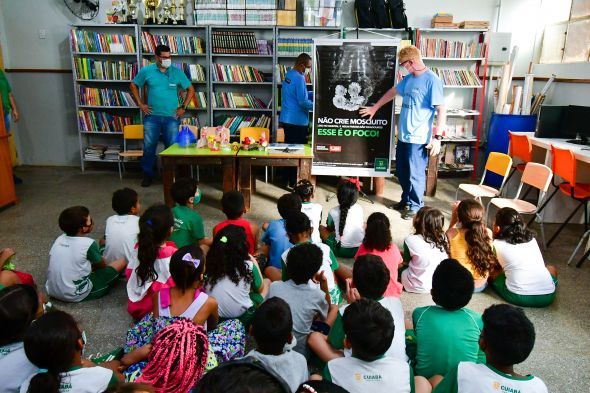EMEB students Esmeralda de Campos Fontes, from the Ribeirão da Ponte neighborhood, learned last week how to combat the spread of the Aedes aegypti mosquito, a vector of diseases such as dengue, Zika virus, chikungunya and yellow fever, with a team from the Education Sector in Zoonoses Health Surveillance.
The Agent for Endemic Disease Control and the technician in charge of the Health Education Sector, Helio Simiao, accompanied by the other agents, José Carvalho and Giovanni Cassio, gave an integrative lecture to children, explaining in a simple way how they can help prevent mosquito breeding and educating their families about the importance of controlling them.
“We are resuming the 10 Minutes Against Aedes project in schools, as it is how we should reach many families, through children. In a playful way, we present the mosquito cycle to children on banners and then show the stages of the mosquito itself in bottles. Our goal is to show them What they can do to eliminate the breeding sites,” Helio commented.
Items such as pet bottles, plastic cups and bottle caps, which are commonly found in all homes, are potential mosquito breeding sites. The team took several toys made from this material to encourage children to turn these objects, which are usually kept in backyards, into recreational artifacts, preventing them from becoming mosquito breeding sites.
Regarding the selection of schools to receive the lecture, Helio said that at present they have chosen teaching units located in the region of the Aedes aegypti Rapid Rise Index (LIRAa). We already have other lectures scheduled at schools in the area. If other institutions would like to request our attendance, simply send us an email at [email protected],” said the technical officer.
For EMEB Esmeralda de Campos Fontes Director, Uga Cruz, the 10 Minutes project against Aedes in schools is of paramount importance. “With the epidemic, everyone forgot about dengue, and yet we started to see many cases of the disease, even among our students. They are our bond in society, because they teach parents the good habits that they learn in school.”

“Wannabe internet buff. Future teen idol. Hardcore zombie guru. Gamer. Avid creator. Entrepreneur. Bacon ninja.”

